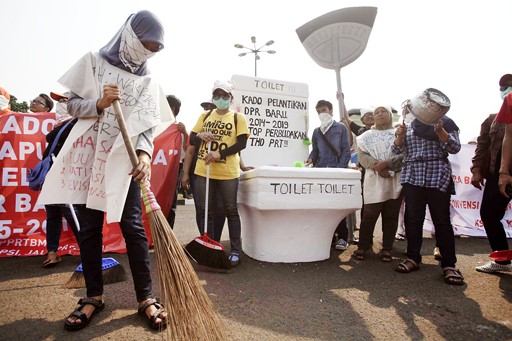Popular Reads
Top Results
Can't find what you're looking for?
View all search resultsPopular Reads
Top Results
Can't find what you're looking for?
View all search resultsMost wage violations against domestic workers 'done by expats'
Change text size
Gift Premium Articles
to Anyone
A
t least 70 percent of the total number of reported cases of economic mistreatment of domestic workers in Jakarta, including uncertain payment and unpaid wages, are committed by expatriates from numerous countries who employ Indonesian maids in their domiciles, the National Network for Domestic Workers Advocacy (Jala PRT) says.
This year's data submitted by Jala PRT to the National Commission on Violence Against Women (Komnas Perempuan) revealed that among 74 cases of economic mistreatment against domestic workers reported from January to mid-September this year, about 70 percent of them were committed by expatriates from South Korea, China, Malaysia, Europe, Japan, the US and Australia.
They work as staff in foreign embassies and as teachers at international schools, Lita Anggraini, Jala PRT national coordinator, said Thursday at a press conference in Komnas Perempuan.
Jala PRT in total received 217 reports of mistreatment during the period, ranging from physical, mental, as well as sexual abuses. The highest number, 102, concerned physical abuse, isolation and human trafficking committed by mostly Indonesians. The remaining 41 cases are multiple abuses: psychological, physical, economic and sexual, the data say.
"When [the expatriates] realize that Indonesia does not have laws that rule employment of domestic workers, they start to neglect wage payments as well as health and social insurance. Some even fire their housemaids nearing the Idul Fitri holiday so that they don't have to pay the bonus," Lita told The Jakarta Post on Thursday.
In some cases, the employers initially paid their domestic workers more than Rp 2 million per month, but then they reduced the amount after about three months. They also initially agreed to an overtime rate of Rp 40,000 per hour, but then unilaterally reduced it to Rp 10,000 per hour. If the housemaids refused to accept the payment, the employers would fire them and look for other housemaids and thus the cycle would keep going, Lita said.
In reality, however, it doesn't mean expats in general are worse employers than their Indonesian counterparts. In fact, some skilled domestic workers prefer working for expats because they have working contracts. Most domestic workers in Indonesia have no contracts with their Indonesian employers.
Lita said the cases were the tip of the iceberg because many domestic workers did not report or ask for assistance from the organization.
"There are also many Indonesian employers [who mistreat their employees] but the majority of those who reported and got assistance from us [in 2016] worked under expats. The 74 cases are only those who reported to us," Lita told The Jakarta Post.
According to Lita, other domestic workers who experience economic mistreatment are often afraid to report the abuse because they are afraid of their employers. Many who come from rural areas to work in Jakarta choose to remain silent in order to keep their jobs.
Those brave enough to report to Jala PRT were domestic workers who had connections with groups such as the Sapu Lidi Domestic Worker Association, Lita said, adding that both organizations had gathered the data by reaching out first to the housemaids.
Ludiyah, a domestic worker belonging to the Sapu Lidi Domestic Worker Association, who once got fired by her expatriate boss without being fully paid, said many of her friends worked for periods of time ranging from several months to two years at foreigners' houses without being paid at all.
Some housemaids got their cases settled through the help of Jala PRT and public lawyers from the Jakarta Legal Aid Institution (LBH Jakarta), but there were also some who could not get a response from their former employers and they therefore had their right of receiving payment for their work violated. (evi)
Editor's note: This article has been updated to provide more context about the data provided by Jala PRT.










